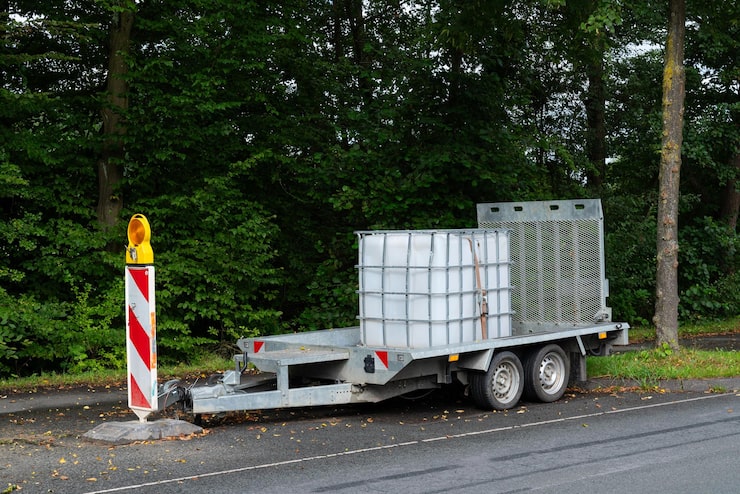Running a logistics yard efficiently requires more than just moving trailers in and out of docks. It demands structured planning, constant monitoring, and compliance with strict safety standards. Even small inefficiencies can quickly add up in a high-volume facility, costing thousands of dollars in wasted time, fuel, and labour. The most effective way to uncover these inefficiencies is through an operational yard audit.
An operational yard audit provides managers with a clear, data-driven review of how their yard functions. It identifies strengths, highlights weaknesses, and delivers recommendations that lead to measurable improvements in efficiency and safety. At Zelo Express, we combine professional operational yard audits with complementary services such as yard spotting, shuttle operations, trailer safety inspections, fleet management, and gate management to deliver complete logistics support.
What Is an Operational Yard Audit
Core Definition
An operational yard audit is a structured evaluation of all yard activities. It reviews trailer movements, dock assignments, driver turnaround times, safety compliance, and equipment use.
Purpose and Goals
The main goal of an operational yard audit is to improve efficiency. By analysing processes and gathering performance metrics, audits help facilities reduce costs, enhance safety, and optimise trailer utilisation.
Why Facilities Need Operational Yard Audits
Identifying Bottlenecks
Congestion and delays are common in busy yards. An operational yard audit highlights where bottlenecks occur, whether at docks, gates, or holding areas.
Reducing Costs
Unnecessary trailer movements, idle drivers, and wasted fuel all increase operating expenses. Audits identify these inefficiencies and provide cost-saving solutions.
Improving Safety
Without structured oversight, unsafe practices can go unnoticed. By including safety checks, operational yard audits ensure facilities comply with standards and protect their staff.
Supporting Continuous Improvement
Supply chains evolve constantly. An operational yard audit helps facilities adapt to changing volumes, technologies, and customer expectations by providing updated performance insights.
How an Operational Yard Audit Works
Step One: Yard Review
The process begins with a physical and procedural review of the yard. This includes evaluating traffic flow, dock layouts, and equipment use.
Step Two: Performance Metrics
Auditors collect key performance indicators such as trailer turnaround times, dock utilisation rates, and driver wait times. These metrics provide a baseline for efficiency.
Step Three: Safety Checks
A critical part of any operational yard audit is safety. Auditors review trailer conditions, signage, lighting, and adherence to compliance standards.
Step Four: Staff Interviews
Employees provide valuable insight into daily challenges. Interviews with drivers, spotters, and managers highlight areas where processes may not match actual practice.
Step Five: Reporting and Recommendations
The findings are compiled into a report with practical recommendations. At Zelo Express, we also align these recommendations with services such as trailer safety inspections, shuttle operations, and fleet management to create actionable solutions.

Benefits of an Operational Yard Audit
Faster Trailer Turnaround
By uncovering inefficiencies, operational yard audits reduce trailer idle times, allowing drivers to move in and out of facilities faster.
Improved Dock Utilisation
Audits ensure that docks are being used effectively. If a dock sits idle too often, the audit highlights scheduling or trailer placement issues.
Lower Costs
Through better planning and reduced waste, operational yard audits help facilities save on labour, fuel, and equipment use.
Safer Working Environment
Identifying hazards and enforcing compliance ensures a safer yard, protecting workers and reducing liability for the company.
Better Supply Chain Reliability
Efficient yards directly improve supply chains by reducing delays and keeping shipments on schedule.
Integrating Operational Yard Audits with Other Services
Yard Spotting Services
Audits highlight whether trailers are being positioned efficiently. Integrating operational yard audits with yard spotting services ensures trailers are always placed correctly.
Shuttle Operations
Moving trailers between yards or facilities is vital. Audits often identify weaknesses in this area, which can be addressed with better shuttle operations.
Trailer Safety Inspections
Audits uncover whether trailers are being properly inspected. Pairing operational yard audits with trailer safety inspections ensures safe and compliant operations.
Fleet Management
By evaluating how fleets are used, audits provide insight into underutilised assets. Integrating fleet management helps reduce waste and improve vehicle productivity.
Gate Management
Entry and exit delays are a common cause of inefficiency. By combining audits with gate management services, facilities eliminate bottlenecks at checkpoints.
Technology in Operational Yard Audits
Yard Management Systems
Data from yard management systems provides accurate information on trailer locations, dock scheduling, and turnaround times. This helps make audits more effective.
Telematics and Tracking
Using GPS and telematics, auditors track trailer and driver movements. This ensures recommendations are based on real-time data.
Analytics and Reporting
Audits generate large amounts of data. Advanced analytics transform this information into actionable strategies for continuous improvement.
Why Choose Zelo Express for Operational Yard Audits
At Zelo Express, our operational yard audits go beyond basic evaluations. We combine industry expertise, technology, and hands-on services to deliver actionable results. Whether through yard spotting, shuttle operations, trailer safety inspections, or fleet management, we ensure recommendations are backed by services that achieve real change.
Our audits are designed not just to highlight problems but also to create long-term solutions that improve efficiency, safety, and compliance across logistics operations.
FAQs
What is a yard performance review?
A yard performance review is a structured evaluation of day-to-day activities in a logistics yard, designed to assess efficiency, safety, and compliance. It examines how trailers are moved, how docks are being utilised, and how traffic flows through the facility. The outcome is a detailed set of insights that managers can use to refine processes, cut costs, and strengthen overall operations.
How do these reviews help improve efficiency?
They shine a light on bottlenecks, measure how long trailers wait before being processed, and evaluate whether docks are being used to their full potential. By identifying areas of waste, facilities can make changes that speed up trailer turnarounds, reduce idle equipment, and increase driver productivity. This leads to smoother daily operations and measurable performance gains.
Are regular evaluations important for compliance?
Yes. Regulatory bodies like OSHA and the DOT often require ongoing checks to ensure that safety and operational standards are being met. Regular evaluations provide the documentation needed to demonstrate compliance during inspections. They also help facilities avoid costly fines and maintain a reputation for safe, professional operations.
Can smaller yards also benefit from these assessments?
Absolutely. Even compact facilities with limited resources face challenges such as congestion, tight scheduling windows, and safety concerns. A performance review provides tailored recommendations that make the best use of available space and staff, ensuring smaller sites achieve the same efficiency improvements as larger ones.
Why should Zelo Express be your choice for professional reviews?
Zelo Express offers more than just evaluations—we provide end-to-end support that includes trailer positioning, shuttle operations, fleet oversight, safety inspections, and gate management. By pairing a thorough review with practical services, we ensure that any identified issues are backed by immediate solutions, making improvements sustainable and results-driven.




